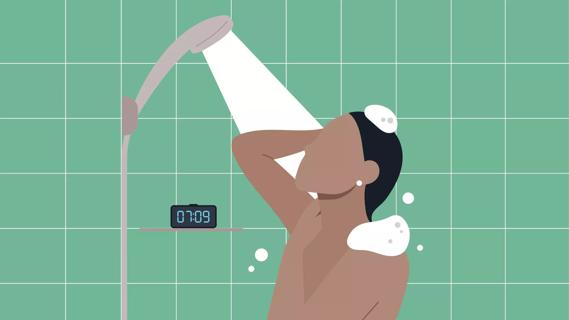Untreated, some infections can be contagious for up to four weeks!

Time flies when you’re having fun. Maybe that’s why it always feels like cold and flu season is either upon us or nipping at our heels. But even if the weather’s more fine than frightful, it’s never a bad time to protect yourself (and the people around you) from germs and viruses.
Advertisement
Cleveland Clinic is a non-profit academic medical center. Advertising on our site helps support our mission. We do not endorse non-Cleveland Clinic products or services. Policy
But to do that successfully, you need to know a bit about the conditions you’re trying to steer clear of, how germs and viruses spread and how to avoid infecting others. After all, knowledge is power. We turned to family medicine physician Matthew Goldman, MD, to learn more about six common illnesses and how to avoid them.
The term “cold” is shorthand for a virus that attacks your upper respiratory system: That is, your nose, throat, sinuses and windpipe. There are actually more than 200 viruses than can cause a cold, but according to Dr. Goldman, the same basic rules of prevention apply across the board.
Here’s what you need to know about the common cold:
Advertisement
Like the common cold, the flu is caused by a virus. Here’s what you need to know about it:
Unlike colds and flus, bronchitis has multiple different causes. That’s because a lot of things can cause your airways to become inflamed.
If your bronchitis is due to a condition that isn’t contagious, like asthma, gastroesophageal reflux disease or smoke inhalation, you don’t have to worry about passing it on to other people. But there are plenty of contagious conditions — like COVID-19, the flu or whooping cough (pertussis), for example — that can cause bronchitis, too.
Unlike colds and flus, strep throat is a bacterial infection. Dr. Goldman says it’s important to see a healthcare provider if you think you have strep throat because leaving it untreated occasionally causes severe complications like scarlet fever, rheumatic fever or even heart damage.
Advertisement
Pneumonia means that you have inflammation and fluid in your lungs. That can happen when you have a viral, bacterial, fungal or, in rare cases, protozoal infection. But the most common causes of pneumonia are the flu, COVID-19 and pneumococcal disease.
Advertisement
Dr. Goldman explains that there’s a pneumonia vaccine, but it’s not for everybody. Talk to a healthcare provider to find out if it’s the right choice for you and your loved ones.
Despite the name, the stomach flu isn’t actually a flu at all: It’s actually a condition called viral gastroenteritis. This highly contagious condition affects your stomach and intestines. In the same way that many viruses can cause the common cold, many different viruses can cause gastroenteritis. But the most common causes are norovirus and rotavirus.
Advertisement
Viruses, bacteria, fungi, parasites … it’s a jungle out there. Our immune systems have to work hard to protect us from communicable illnesses, especially during cold and flu season. Healthy habits like a nutritious diet, regular exercise and good hygiene can help keep us safe.
But we all get sick eventually. And when we do, it’s important that we do our part to stop the spread.
As we all learned during the COVID-19 pandemic, the surest way to stop the spread of infectious diseases is to stay home when you aren’t feeling well. When you are out and about, practice social distancing, keep your hands washed and disinfect any surfaces you touch. And don’t forget to cover your cough or sneeze with your elbow or, preferably, a mask.
Learn more about our editorial process.
Advertisement

Bathing once a day is the general guidance, but you could also have reasons to soap up twice a day or not at all

You’re sharing your sheets with dust mites, bacteria and lots of dead skin, so you’ll want to keep your bedding fresh

You may notice itching, redness and swelling after wearing or using laundered items

We don’t fully understand how cleanliness impacts immune system development, but we do know that preventing illness is important

How often you lather up your locks can depend on various factors, like hair type, age and ethnicity

An icy blast may boost mental clarity, increase circulation and give your skin a little glow — but don’t overdo it

This olive oil-based soap is generally mild and safe when diluted

It’s a wash — when you bathe is a personal preference

Wearing a scarf, adjusting your outdoor activities and following your asthma treatment plan can help limit breathing problems

Your diet in the weeks, days and hours ahead of your race can power you to the finish line

When someone guilt trips you, they’re using emotionally manipulative behavior to try to get you to act a certain way